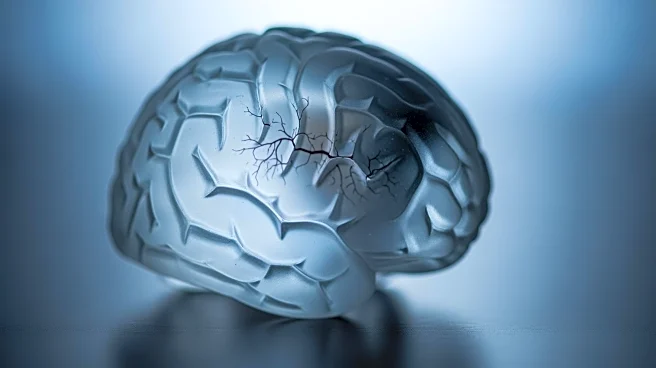What's Happening?
A new study has introduced the BMIgap tool, designed to predict future weight gain by analyzing brain signatures. The tool uses magnetic resonance imaging (MRI) data to assess deviations in brain structure related to body mass index (BMI). The study involved
1,504 healthy controls and several patient populations, including individuals with schizophrenia. The BMIgap tool aims to identify patients at risk for metabolic complications, potentially improving early intervention strategies. The tool's development involved machine learning techniques to predict BMI based on brain structure, offering a novel approach to understanding metabolic vulnerability in psychiatric conditions.
Why It's Important?
The BMIgap tool represents a significant advancement in precision medicine, particularly for psychiatric patients who are at risk of metabolic complications. By providing a method to predict weight gain, healthcare providers can tailor interventions more effectively, potentially improving treatment adherence and reducing mortality rates. This tool could lead to better management of psychiatric conditions by addressing metabolic health, which is often overlooked. The ability to predict weight gain could also inform the development of personalized treatment plans, enhancing patient outcomes and reducing healthcare costs associated with metabolic syndromes.
What's Next?
The integration of the BMIgap tool into clinical assessments could transform how psychiatric patients are managed, with potential applications in psychotherapy, medication adjustments, and brain stimulation therapies. Future research may focus on refining the tool's predictive capabilities and exploring its use in other populations. The tool's success could prompt further studies into brain-based biomarkers for other health conditions, expanding the scope of precision medicine.
Beyond the Headlines
The ethical implications of using brain imaging to predict health outcomes are significant, raising questions about privacy and consent. As the tool becomes more widely used, discussions around data security and patient autonomy will be crucial. Additionally, the tool's reliance on advanced imaging technology may limit its accessibility, highlighting the need for equitable healthcare solutions.














